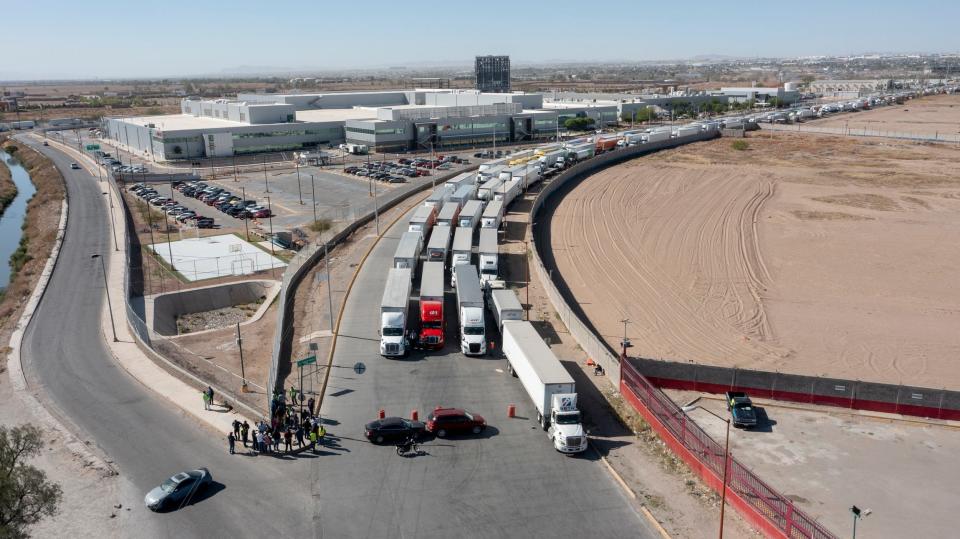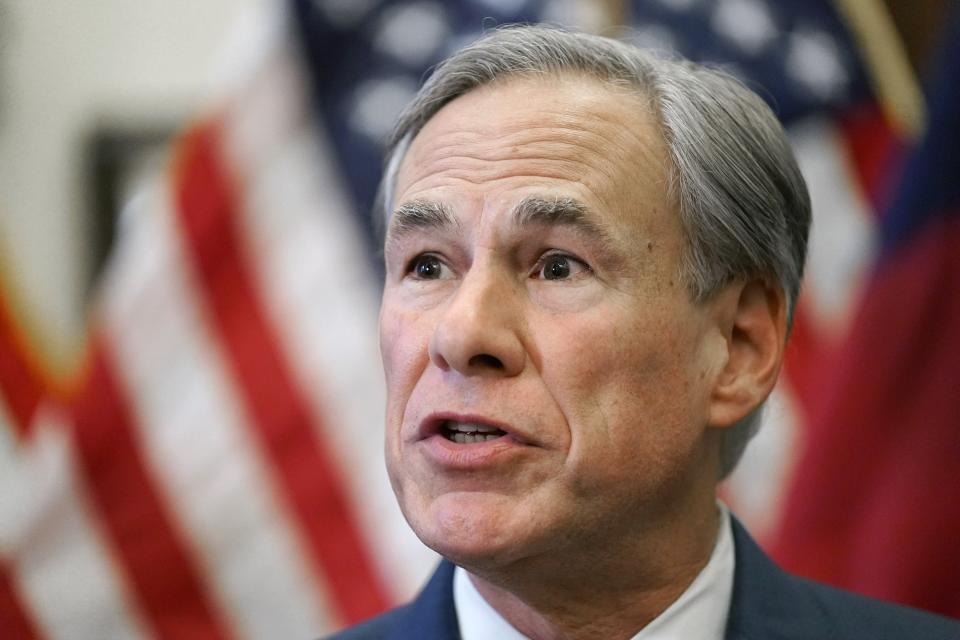Gov. Greg Abbott agrees to ease inspection requirement for trucks at one border crossing
- Oops!Something went wrong.Please try again later.
Gov. Greg Abbott has agreed to ease state inspection requirements for commercial vehicles at one Texas-Mexico border crossing, partially backtracking on his directive after nearly a week of intense backlash and substantial delays at the border.
Abbott said Wednesday that state troopers will no longer inspect every commercial vehicle entering the country through the Laredo-Colombia Solidarity International Bridge after coming to an agreement with Nuevo León Gov. Samuel Alejandro García Sepúlveda.
The two states share about nine miles of border and one port of entry, which processed about 40,000 commercial vehicles during the first two months of the year.
"I understand the concerns businesses have about trying to move products across the border," Abbott said. "But I also know well the frustration of my fellow Texans and my fellow Americans caused by the Biden administration not securing our border."
In exchange, García said Nuevo León would agree to enhance security enforcement measures at the border.
But this agreement still leaves every other Texas-Mexico bridge subject to the inspection mandate, offering little relief to businesses and consumers on both sides of the border. So far, the additional inspections have been limited to bridges in El Paso and Laredo.
Abbott said he wants to work with governors of the three other Mexican states bordering Texas — Tamaulipas, Coahuila and Chihuahua — to come to similar agreements, noting that those conversations are slated to start Thursday.
"Until, however, those agreements are reached with those states, the Texas Department of Public Safety will continue to thoroughly inspect vehicles entering the United States from every Mexican state except Nuevo León," he said.

More: Texas inspections of cross-border commercial traffic choke international trade
Clogged bridges at Texas-Mexico border clogs traffic, might hamper economy
On April 6, Abbott imposed the extra inspection requirements for commercial vehicles, directing the DPS to inspect every incoming truck after it clears federal customs checkpoints and drives onto Texas soil.
The result has been hourslong delays at key bridges connecting both countries and massive disruptions to the manufacturing supply chain, which could soon be felt by U.S. factories, consumers and the Texas economy.
"Border bridges have become clogged because of a policy by Texas to thoroughly inspect vehicles coming from Mexico," Abbott said at Wednesday's event.
It is unclear whether the inspections are bolstering immigration or drug enforcement, however. When he first issued the order, Abbott said DPS troopers will be conducting the same inspections on commercial vehicles at the border that they conduct on other state roads.
During those reviews, troopers typically identify possible safety issues with a vehicle such as faulty brakes and defective tires. They also check whether drivers are in compliance with state and federal laws, including whether they have the appropriate license to operate their vehicle and whether they have violations of hours-of-service requirements limiting how many consecutive hours they can spend behind the wheel.
Abbott said the inspections conducted so far found that almost 25% of vehicles entering Texas from Mexico "were unsafe for Texas roads and were removed from service."
More: First bus of migrants arrives in Washington from the Texas-Mexico border
But John Esparza, president of the Texas Trucking Association, said the state inspections are duplicative of efforts already underway at the border. Rather than improving safety, he said they are resulting in significant congestion and worsening existing supply chain issues.
“The current situation on the border simply cannot be sustained,” Esparza said in a statement. “As delays increase at the border, deliveries are postponed or canceled, perishable goods spoil, and grocery and retail store shelves begin to empty. Exports in Texas also await empty trucks on the Mexican side of the border and the lost revenue due to these delays will be felt by consumers as the price of goods increase across the country.”
Tensions have continued to rise since the directive was implemented. On Tuesday, hundreds of truckers began blocking traffic across the Zaragoza International Bridge in protest of Abbott's policy and extremely long wait-times. Truckers typically wait two or three hours to cross the bridge into El Paso from Juárez, but this week the lines have lasted for 10-plus hours.
Texas Gov. Greg Abbott's truck inspection mandate called 'unnecessary inspections'
The delays have resulted in a 60% drop in commercial traffic at the border, according to U.S. Customs and Border Protections. The agency said the delays are a direct result of "additional and unnecessary inspections being conducted" at Abbott's request.
Abbott said his order was a direct response to the Biden administration’s decision to end Title 42, a Trump-era coronavirus policy that allowed the federal government to expel asylum-seekers before they were given the opportunity to make a case for staying in the country legally.
White House press secretary Jen Psaki said Wednesday that Abbott’s inspections are causing “significant disruptions to the food and automobile supply chains" nationwide.
“The continuous flow of legitimate trade and travel and CBP’s ability to do its job should not be obstructed,” she said in a statement. “Gov. Abbott’s actions are impacting people’s jobs, and the livelihoods of hardworking American families.”
More: Operation Lone Star needs another $531 million, National Guard leader tells lawmakers
Abbott also faced calls to end the effort from the governors of Tamaulipas and Coahuila.
Tamaulipas Gov. Francisco García Cabeza de Vaca and Coahuila Gov. Miguel Angel Riquelme Solis sent a letter to Abbott on Tuesday, urging him to reconsider the state inspection requirements that they say “are creating havoc and economic pain on both sides of the border.”
“Unfortunately, political points have never been a good recipe to address common challenges or threats,” the letter reads. “However, taking advantage of collaborative opportunities to address issues is the best way to solve problems. What we have today is a no-win situation for anyone.”
Esta tarde, junto al Gobernador de #Coahuila, @mrikelme, enviamos una carta a nuestro homólogo de #Texas, @GregAbbott_TX, solicitando respetuosamente que reconsidere las políticas de inspección de vehículos de carga implementadas en los puertos fronterizos de su estado. pic.twitter.com/iIdKN1wKHR
— Fco. Cabeza de Vaca (@fgcabezadevaca) April 13, 2022
The leaders expressed concern about high logistics costs and environmental damage associated with the delays at the border.
“Trade security between Mexico and the United States is national security for both countries and we realize that there are serious issues that must be addressed, and we think it is important we all come to the table,” they wrote. “We must find another way than blocking international commerce.”

Abbott said he was prepared to hear from government officials in Mexico, noting that "it is a very high price to pay with regard to what is going on on the border."
"Sometimes it just takes action like that to spur sitting down and working things out," he said.
Data reporter Caroline Ghisolfi contributed to this report.
This article originally appeared on Austin American-Statesman: Texas Gov. Greg Abbott eases border inspection requirement

